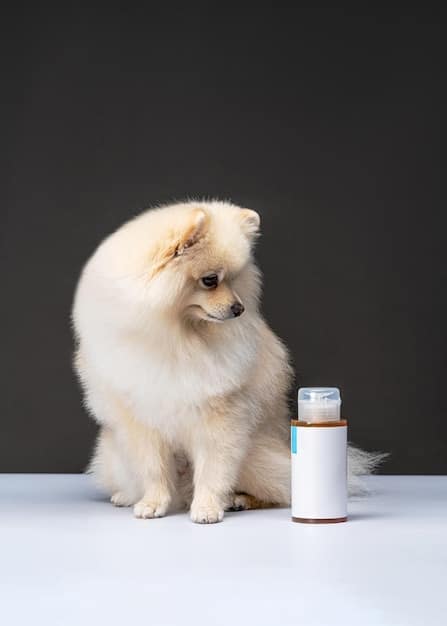Gut Health and Anxiety in Dogs: New Research & Probiotic Guide

New research highlights a significant link between gut health and anxiety in dogs, suggesting that probiotics can play a crucial role in managing canine mental wellbeing.
Is your furry friend struggling with anxiety? New research: the link between gut health and anxiety in dogs – probiotic guide may offer a surprising solution.
Unveiling the Gut-Brain Connection in Dogs
The gut-brain connection, a fascinating area of study, reveals how the digestive system and brain communicate. This connection plays a vital role in a dog’s overall health, influencing everything from digestion to mood.
Understanding this relationship is crucial for pet owners seeking to address anxiety and behavioral issues in their canine companions. A healthy gut can lead to a happier, more balanced dog.
The Science Behind the Gut-Brain Axis
The gut-brain axis is a complex network involving the vagus nerve, gut microbiota, neurotransmitters, and the immune system. This intricate communication system allows the gut and brain to constantly exchange information, influencing various physiological processes.
How Gut Microbiota Influences Canine Anxiety
Gut microbiota, the community of microorganisms residing in the digestive tract, plays a key role in producing neurotransmitters like serotonin and dopamine. These neurotransmitters are essential for regulating mood and behavior. An imbalance in gut microbiota can disrupt neurotransmitter production, leading to anxiety and other behavioral issues in dogs.
- Neurotransmitter Production: A healthy gut supports the production of mood-regulating neurotransmitters.
- Immune System Modulation: Gut bacteria influence the immune system, which can affect brain function.
- Vagus Nerve Communication: Signals from the gut travel to the brain via the vagus nerve.
By understanding the science behind the gut-brain axis, pet owners can take proactive steps to support their dog’s mental wellbeing. A balanced gut microbiota is essential for maintaining a healthy connection between the gut and brain, promoting a calmer and happier canine companion.
The Role of Probiotics in Improving Gut Health
Probiotics, live microorganisms that provide health benefits when consumed, are gaining recognition for their potential to improve gut health in dogs. By introducing beneficial bacteria into the digestive tract, probiotics can help restore balance and promote a thriving gut microbiota.
This, in turn, can have a positive impact on a dog’s overall health and wellbeing, including their mental state. Probiotics offer a natural and effective way to support a healthy gut-brain connection.

Choosing the Right Probiotic for Your Dog
Selecting the right probiotic for your dog is crucial for maximizing its benefits. Different probiotic strains offer unique health advantages, so it’s important to choose a product that contains strains specifically beneficial for canine gut health. Consult with your veterinarian to determine the best probiotic for your dog’s individual needs.
- Strain Specificity: Look for probiotics containing strains like Lactobacillus and Bifidobacterium.
- CFU Count: Ensure the probiotic has an adequate colony-forming unit (CFU) count.
- Quality and Purity: Choose a reputable brand that guarantees the quality and purity of its product.
When introducing probiotics to your dog’s diet, start with a small dose and gradually increase it to the recommended amount. Monitor your dog for any adverse reactions and adjust the dosage accordingly. Consistency is key, as it may take several weeks to see noticeable improvements in gut health and behavior.
New Research: Probiotics and Anxiety Reduction in Dogs
Recent studies have shed light on the potential of probiotics to reduce anxiety in dogs. These studies suggest that certain probiotic strains can positively influence the gut-brain axis, leading to a reduction in anxiety-related behaviors.
By modulating gut microbiota composition, probiotics can help restore balance and promote the production of mood-regulating neurotransmitters. This can have a significant impact on a dog’s overall mental health and wellbeing.

Key Findings from Recent Studies
Several studies have explored the link between probiotics and anxiety reduction in dogs. One study found that dogs supplemented with probiotics exhibited lower levels of cortisol, a stress hormone, compared to those receiving a placebo. Another study reported a reduction in anxiety-related behaviors, such as excessive barking and destructive chewing, in dogs treated with probiotics.
- Cortisol Reduction: Probiotics can help lower stress hormone levels.
- Behavioral Improvements: Anxiety-related behaviors may decrease with probiotic supplementation.
- Gut Microbiota Modulation: Probiotics can improve the composition of gut bacteria.
The findings from these studies provide compelling evidence that probiotics can be a valuable tool in managing anxiety in dogs. While more research is needed to fully understand the underlying mechanisms, the current evidence suggests that probiotics offer a promising and natural approach to supporting canine mental health.
Practical Tips for Implementing Probiotics in Your Dog’s Diet
Incorporating probiotics into your dog’s diet can be a simple and effective way to support their gut health and potentially reduce anxiety. There are several ways to administer probiotics, including supplements, probiotic-rich foods, and specially formulated dog foods.
Consistency is key, so it’s important to establish a routine and adhere to it. Consult with your veterinarian to establish the best approach for your dog’s individual needs and health condition.
Different Ways to Administer Probiotics
Probiotics can be administered in diverse ways, each offering unique benefits. Probiotic supplements, which usually come in capsules, chewable tablets, or powders, present a concentrated dose of beneficial bacteria.
Certain foods and dog food brands have probiotics added into them, creating a balanced diet, as well. The method utilized may come down to canine behavior and what your pet finds more appetizing.
Monitoring Your Dog’s Progress
When introducing probiotics to your dog’s diet, it’s important to closely monitor their progress. Look for improvements in their digestive health, such as reduced bloating and increased regularity. Additionally, observe their behavior for any signs of anxiety reduction, such as decreased barking, pacing, or restlessness.
- Track Digestive Health: Monitor for changes in stool consistency and frequency.
- Observe Behavioral Changes: Note any reductions in anxiety-related behaviors.
- Consult Your Veterinarian: Seek professional advice for any concerns or questions.
Be consistent with probiotic administration and allow sufficient time for the beneficial bacteria to colonize the gut. If you have any concerns or questions, don’t hesitate to consult with your veterinarian. They can provide personalized guidance and monitor your dog’s progress.
Lifestyle Changes That Complement Probiotic Use
While probiotics can be a valuable tool in managing anxiety in dogs, they are most effective when combined with other lifestyle changes. A holistic approach that addresses both physical and mental wellbeing is essential for achieving optimal results.
Factors such as diet, exercise, mental stimulation, and environmental management can all play a significant role in reducing anxiety and promoting overall health. By incorporating these elements into your dog’s routine, you can create a supportive environment that complements the benefits of probiotic use.
The Importance of Diet and Exercise
A balanced and nutritious diet is essential for supporting gut health and brain function. Avoid processed foods and opt for high-quality dog food that contains whole ingredients. Regular exercise is also crucial for reducing stress and promoting mental wellbeing. Aim for daily walks, play sessions, or other physical activities that your dog enjoys.
Creating a Stress-Free Environment
Stressful environments can exacerbate anxiety in dogs. Create a safe and comfortable space for your dog to retreat to when they feel overwhelmed. Minimize exposure to loud noises, sudden changes, and other potential stressors. Provide plenty of mental stimulation through interactive toys, training exercises, and puzzle games.
- Nutritious Diet: Feed your dog high-quality, whole-ingredient food.
- Regular Exercise: Provide daily physical activity to reduce stress.
- Safe Environment: Create a calm and comfortable space for your dog.
By implementing these lifestyle changes alongside probiotic use, you can create a comprehensive approach to managing anxiety in your dog. Remember to be patient and consistent, as it may take time to see noticeable improvements. With dedication and care, you can help your furry friend live a happier, healthier, and more balanced life.
When to Consult Your Veterinarian
While probiotics can be a helpful tool in managing mild anxiety in dogs, it’s important to recognize when professional veterinary care is necessary. If your dog’s anxiety is severe, persistent, or accompanied by other concerning symptoms, it’s crucial to consult with your veterinarian. Early diagnosis and treatment can prevent the condition from worsening and improve your dog’s overall quality of life.
Your veterinarian can conduct a thorough examination, assess your dog’s health history, and recommend the most appropriate course of action. This may include further diagnostic testing, medication, behavioral therapy, or a combination of these approaches.
Signs of Severe Anxiety in Dogs
It’s important to be able to identify severe anxiety versus mild anxiety to ensure the dog receives the proper care. Constant pacing and panting, destructive behavior despite training, and self-harming actions are all red flags that your vet should know about.
The Importance of Professional Guidance
Your veterinarian can develop a tailored treatment plan, offer guidance on behavioral modification, and prescribe medications if necessary. Working closely with your vet ensures that your dog receives the best possible care, leading to improved mental health and overall wellbeing.
- Severe Symptoms: If your dog experiences severe anxiety symptoms, seek professional help.
- Underlying Health Conditions: Your veterinarian can rule out any underlying health issues.
- Personalized Treatment: Professional guidance ensures your dog receives the most appropriate care.
Probiotics can be a useful adjunct to traditional treatments for anxiety, but they should not replace professional veterinary care when necessary. With a collaborative approach, you and your veterinarian can work together to improve your dog’s mental health and bring a sense of calm and happiness back into their life.
| Key Point | Brief Description |
|---|---|
| 🧠 Gut-Brain Axis | Connection between gut microbiota and mental health in dogs. |
| 🦠 Probiotics | Beneficial bacteria that can improve gut health and reduce anxiety. |
| 📊 New Research | Studies show probiotics can lower cortisol levels and improve behavior. |
| 🌱 Lifestyle | Diet, exercise, and stress management complement probiotic use. |
▼
Emerging research suggests a promising link between gut health and anxiety in dogs, indicating probiotics may reduce anxiety-related behaviors by improving gut flora, which influences neurotransmitter production.
▼
Choosing the right probiotic involves looking for dog-specific strains like Lactobacillus and consulting with your vet. The CFU count and brand reliability are also important indicators of product quality.
▼
Generally, probiotics are safe, but some dogs may experience mild digestive upset initially. Introduce probiotics gradually and monitor your dog for any adverse reactions, adjusting the dosage or product if needed.
▼
Results can vary, but typically it takes a few weeks to a couple of months to observe noticeable improvements in your dog’s anxiety levels and digestive health after beginning probiotic supplementation.
▼
No, consult with your veterinarian before making changes to your dog’s treatment plan. Probiotics can be a part, not a replacement, for a comprehensive anxiety management strategy.
Conclusion
In conclusion, the emerging link between gut health and anxiety in dogs presents a promising avenue for managing canine mental wellbeing through probiotic supplementation. While probiotics offer a natural and potentially effective approach, they are most beneficial when combined with a holistic lifestyle that addresses diet, exercise, and environmental stressors. Remember to consult with your veterinarian for personalized guidance and to ensure the best possible care for your furry friend.





